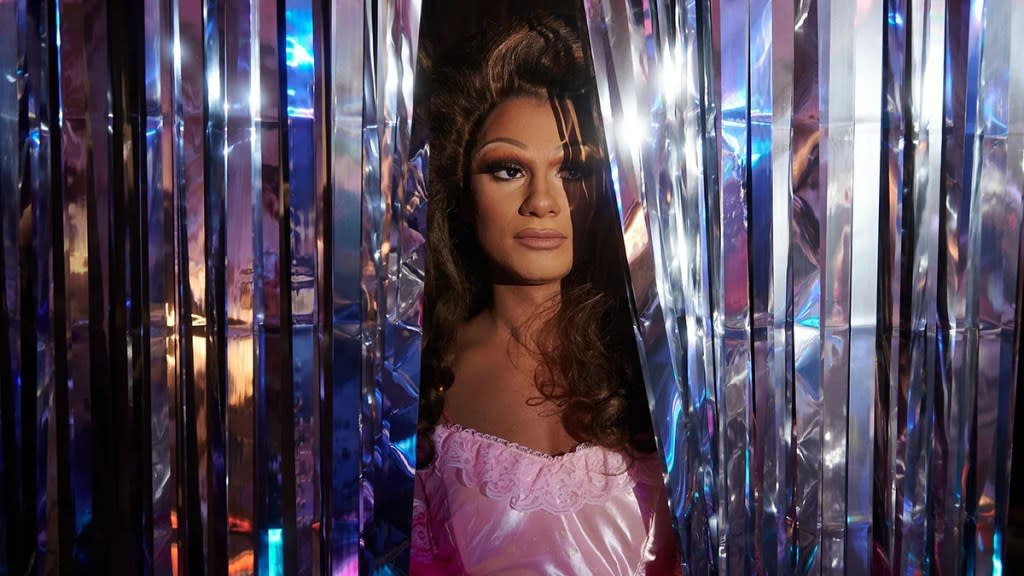‘Layla’ Review: Bilal Hasna Breaks Out in a Convention-Defying Role

“Give me my meat!” Layla screams, pissed off and with good cause. Layla and their fellow drag queens were hired to perform at a Pride event for a meal delivery service called Fork Me, and they’ve just been royally forked. What else can you call it when you’re paid in coupons instead of real money? And what else can you do in retaliation except turn yourself into a glorious spectacle and rub carnivore grub all over your skin?
“Layla,” premiering at this year’s Sundance Film Festival, is the feature directorial debut of writer/director Amrou Al-Kadhi, who you may know as a famous non-binary Muslim drag performer, and who you may also know from their cameo in the queer polyamorous superhero blockbuster “Venom: Let There Be Carnage.” This film has a lot more to do with their background as a non-binary Muslim drag performer than it does about alien symbiotes but that’s probably for the best.
Bilal Hasna (“Extraordinary”) stars as the title character, a non-binary drag performer from a Muslim family who can’t seem to find anyone to love. Or, at the very least, they can’t find anyone who loves all of them, even the parts they don’t appreciate themselves. Online hook-ups fall apart, mid-coitus, when Layla’s partner catches a glimpse of their femme paraphernalia. You can do better, Layla!
And, hey, maybe Layla’s new lover, Max (Louis Greatorex, “Last Tango in Halifax”) is just what they’re looking for. Enchanted by Layla’s meat meltdown, even though it cost him a lucrative client, Max tags along for a trip to Feathers, a queer nightclub that’s on the verge of shutting down. A night of magic and wonder and rooftop romance later, and Layla is pretty much in love. Max seems to love them too. The keyword being seems to.
Al-Kadhi’s “Layla” is beautiful and wounded, just like Layla themself. And like Layla, the film dedicates a lot of its time to exploring the complexities and complications of queer identity and relationships. Layla tells Max they were shunned by their family after coming out, but the truth is they never told them. They stare plaintively at their sister’s wedding dancers, unable to express femininity in any way in that environment, but specifically, heartbreakingly, not able to express femininity through their own culture.
Max seems to love Layla for their theatrical drag persona and feminine charms, but when they learn Layla is non-binary they can’t wrap their head around it, and Layla’s afraid Max may not love them the way they are. But maybe, since there are so many facets to Layla, they can settle for a lover who only loves a part of them. They can even go full masc if that will save the relationship, although the fact that Layla’s performative masculinity takes the form of drab, colorless clothes that couldn’t scream “I’m miserable” any more if they were equipped with loudspeakers doesn’t support that hypothesis.
In many respects, “Layla” is a familiar romantic drama about two people finding each other, struggling to see each other, and coming to realizations about themselves in the process. It’s sweet when it’s sad and it’s sad when it’s sweet. Hasna and Greatorex have impressive chemistry and then twist it so that the same events that brought them together now seem to push them apart. You want them to end up together at the start of the film, but as you get to know them better your opinion is likely to change.
There are moments when Al-Kadhi’s film veers into subversion, or at least salaciousness, which makes all that aforementioned familiarity a little less familiar. There’s a sex scene with a shoe you’re going to remember for a very long time, and characters tend to namecheck decidedly unromantic movies. Layla says their favorite film is genuinely “Saw V” (an unusual choice amongst “Saw” fans, one that makes Layla seem all the more fascinating). And their friends briefly consider a queer critical reading of “The Human Centipede,” although the movie is probably better off not getting sidetracked by that particular body horror… classic?
More than anything “Layla” is a lovely character study about a lovely character who makes mistakes and learns from them. A Sundance-friendly indie romance rich with specificity and led by what could, and by all rights should, be a breakout role for Bilal Hasna. An intimate and sensual and highly forking successful debut from Amrou Al-Kadhi.
“Layla” is a sales title at Sundance.
Check out all our Sundance news here.
The post ‘Layla’ Review: Bilal Hasna Breaks Out in a Convention-Defying Role appeared first on TheWrap.


